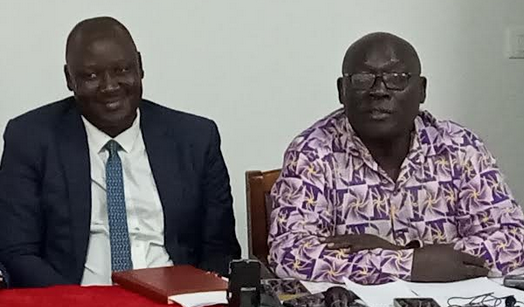The Union of Journalists of South Sudan (UJOSS) on Wednesday announced the launch of a Journalism Excellence Awards competition across South Sudan.
The award event for the best awardees will be on 28 November 2023 and is part of UJOSS’ efforts to encourage professionalism and beat reporting and journalists are urged to compete in the process.
“The reasons as to why we think these awards are very important is because we think that it will promote professionalism, good journalism, and some level of specialization,” UJOSS President Patrick Oyet told journalists during a press conference to announce the launch of the Journalism Excellency Awards in Juba on Wednesday.
“We want to move away from this idea where one journalist reports on everything,” he added. “We are moving towards a direction that at least a journalist should be specialized in a certain field, even if he or she will still be reporting on other areas.”
According to Oyet, the best news reports will be considered from Equatoria, Barh el Ghazel, and Upper Nile regions.
“Stories published between 1 April and 31 October 2023 will be accepted so if anyone wants to work on a story to be published and they want to submit it for awards they are welcome as long as it will not be in November 2023,” he clarified.
For his part, Gabriel Joseph Shadar, the secretary for the committee of excellence awards judges who is also a senior journalist at UN’s Radio Miraya, said the initiative is a great move to enable journalists to improve professionally.
“This is an opportunity for all of us working in the media to improve ourselves in many ways. Some of us are presenters, reporters, investigators and some are great interviewers who do good debates but the bottom line is we want to push for specialization, which we call the beats,” he stated. “Journalists should start having their beats, where they specialize and follow the issues, and when you follow a beat in 5 years you become an expert. When specialize for 10 years, you become a consultant.”
Shadar said the competition will be bi-lingual in Arabic or English.
Meanwhile, the commissioner of the Access to Information Commission, Moyiga Nduru, one of the judges on the awards committee, said the process is open to all journalists across South Sudan.
“As judges, we expect journalists to apply from any corner of the country; from Renk to Nimule from Kapoeta to Abyei, we expect every journalist to participate,” he said. “What we expect as judges from those who will be submitting their work is; first originality of your work, not plagiarism. Secondly, evidence of sweat or hard work such as how many people have you interviewed or quoted for those who work in print. For those who work broadcasting, it is the number of sound bites, and thirdly, the level of research in your work.” Moyiga explained.
Susan Alponse, the head of the judges’ committee, who is also the Director General at the South Sudan Broadcasting Corporation, said some journalists have not been recognized and that the awards will give them exposure.
“We also have those in the states who have been doing a lot of work serving our people but they are not been heard and appreciated,” she said.
The five judges who vet the stories for the news reports for the excellence awards are Moyiga Nduru, the commissioner of the Access to Information Commission, Sapana Abuyi, the Director General of the Media Authority, Gabriel Joseph Shadar, the secretary of the judges’ committee and senior journalist at the UN Radio Miraya, Rebecca Lorins, the Dean of the School of Journalism at the University of Juba and Susan Alphonse.
The categories for the excellence awards are:
1. Excellency award on health.
2. Excellency award on economy and business.
3. Excellency Award in Political and Human Rights reporting.
4. Peace journalism reporting.
5. Excellency on education reporting.
6. Excellency on climate change reporting.
7. Gender reporting.
8. Youth and sports reporting.
9. Still photography.
10. Culture reporting award.




